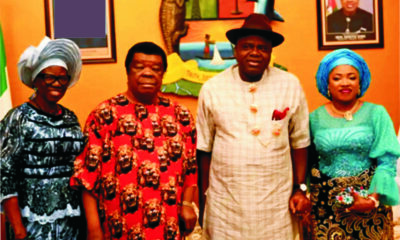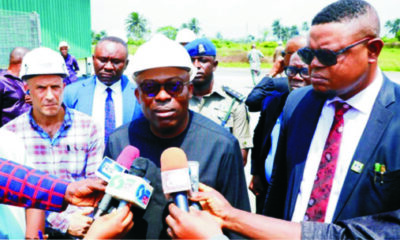Featured
FG Exceeds Loan Target By N1.12trn, Borrows N5.3trn
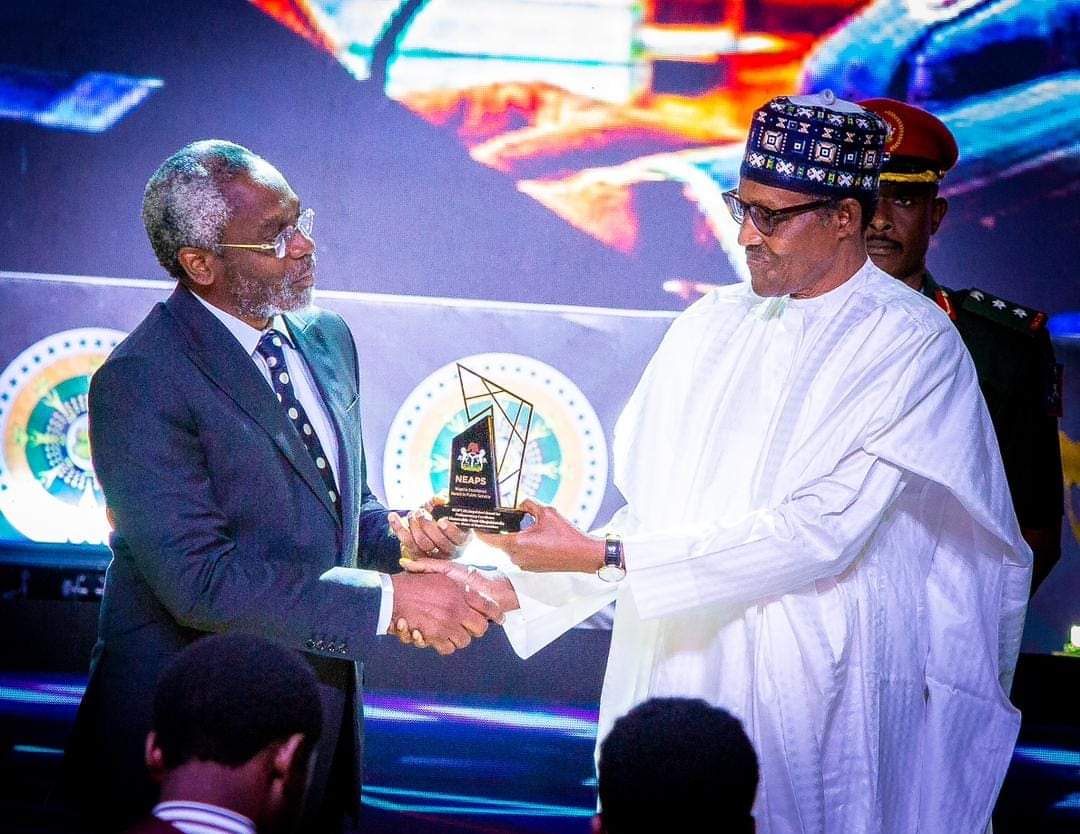
The Federal Government exceeded its borrowing by N1.15trillion for the period between January and August, 2022.
A copy of the public presentation of the 2023 proposed budget by the Minister of Finance, Budget and National Planning, Mrs Zainab Ahmed, showed that the Federal Government planned to borrow N6.10trillion in 2022.
A breakdown shows that the Federal Government planned to get N3.53trillion from domestic creditors and N2.57trillion from foreign creditors.
According to the document, the Federal Government estimated that it would borrow N4.07trillion between January and August, 2022.
However, the Federal Government accumulated N5.33trillion debt within the period under review, which is N1.15trillion higher than the expected N4.07trillion planned debt.
A further breakdown showed that the Federal Government borrowed N4.82trillion from domestic creditors and N510.21billion from foreign creditors.
The debt from domestic creditors includes the Federal Government’s borrowing from the Central Bank of Nigeria through the Ways and Means Advances.
Ways and Means’ Advances are loan facilities through which the CBN finances the shortfalls in the government’s budget.
The Federal Government recently borrowed a total of N4.61trillion from the Central Bank of Nigeria through Ways and Means Advances between January and August, 2022.
This means that majority of the Federal Government’s domestic debt came from its debt to the CBN.
The CBN said on its website that the Federal Government’s borrowing from it through the Ways and Means Advances could have adverse effects on the bank’s monetary policy to the detriment of domestic prices and exchange rates.
“The direct consequence of central banks’ financing of deficits are distortions or surges in monetary base leading to adverse effects on domestic prices and exchange rates i.e. macroeconomic instability because of excess liquidity that has been injected into the economy,” it said.
The World Bank had, last November, warned the Nigerian government against financing deficits by borrowing from the CBN through the Ways and Means Advances, saying this put fiscal pressures on the country’s expenditures.
Despite warnings from experts and organisations, the Federal Government has kept borrowing from the CBN to fund budget deficits.
Also, the N22.07trillion owed the apex bank by the Federal Government is not part of the country’s total public debt stock, which stood at N42.84trillion as of June 2022, according to the Debt Management Office.
The country’s debt rose by N30.72trillion between July, 2015 and June, 2022, according to data released by the DMO.
According to the DMO statistics, Nigeria’s total debt as of June 30, 2015, stood at N12.12trillion.
By June 30, 2022, the figure had risen to N42.84trillion, which showed an increase of 253.47per cent.
Despite the high increase in debt over the years, the government still plans to borrow N8.4trillion in 2023.
Experts have kicked against the Federal Government’s proclivity for debt, which they have described as unsustainable.
An Abuja-based policy think tank, Agora Policy, said Nigeria’s debt was unsustainable and put the country in a perilous situation due to the high cost of debt servicing.
The group advised the government to deepen and diversify sources of revenue, re-calibrate expenditure to spend smartly, and invest efficiently.
A former President of the National Accountants of Nigeria, Dr Sam Nzekwe, agreed that Nigeria’s debt was unsustainable.
He said, “The debt is huge. If you look at the budget, you will see that a huge sum of money is used to service debts. This is just the debt service charge. We are yet to talk about the principal.”
He also said that instead of focusing on the debt to GDP ratio, the focus should be on debt service to revenue ratio.
He further noted that the country had a revenue problem.
A development economist, Dr AliyuIlias, criticised the government for its constant reliance on borrowing, which was not healthy for the economy.
He further urged the government to seek better ways of generating revenue rather than persistently borrowing.
However, the finance minister, when she appeared before the House of Representatives Committee on Finance, last week, explained that the over-borrowing was a deliberate plan to ensure that money was released early for capital projects.
She said, “We are borrowing faster than what we had prorated. It was a conscious decision to make sure we have funds early enough to release for the implementation of capital projects.”
Meanwhile, the amount budgeted for recurrent expenditures has increased from N2.61trillion spent in 2015 to N8.27trillion in the proposed 2023 budget, according to data from the Budget Office of the Federation.
This shows an increase of N5.66trillion or 216.86per cent in six years, fuelling concerns over the rising cost of government overheads amid declining revenue and weakening economy.
Analysis revealed that recurrent expenditure recorded significant increases each year during the period under the review.
The former President, Dr Goodluck Jonathan, approved a N4.49trillion budget for 2015, which included a N2.61trillion recurrent expenditure.
Capital expenditure was N557billion, while money budgeted for debt service was N953.62billion.
There was a fiscal deficit of N1.08trillion.
The recurrent expenditure rose slightly by 1.53per cent or N40billion to N2.65trillion in 2016, out of a total expenditure of N6.06trillion.
Capital expenditure was N1.59trillion, while money budgeted for debt service was N1.48trillion.
There was a fiscal deficit of N2.2trillion.
In 2017, it rose to N2.99trillion, representing an increase of N340billion or 12.83per cent.
Out of a total expenditure of N7.44trillion, capital expenditure was N2.18trillion, while money budgeted for debt service was N1.66trillion.
There was a fiscal deficit of N2.36trillion.
In 2018, recurrent expenditure rose by N520billion or 17.39per cent, raising the total recurrent expenditure to N3.51trillion.
Out of a total expenditure of N9.12trillion, capital expenditure was N2.87trillion, while money budgeted for debt service was N2.01trillion.
There was a fiscal deficit of N1.95trillion.
The following year, the recurrent expenditure increased by N540billion or 15.38per cent to N4.05trillion.
Out of a total expenditure of N8.91trillion, capital expenditure was N2.09trillion, while money budgeted for debt service was N2.25trillion.
There was a fiscal deficit of N1.95trillion.
The recurrent expenditure was N4.84trillion in 2020, out of a total expenditure of N10.59trillion.
This shows an increase of N790billion or 19.51per cent.
Capital expenditure was N2.47trillion, while money budgeted for debt service was N2.7trillion.
There was a fiscal deficit of N2.28trillion.
However, the increase in 2020 may be attributed to the inclusion of the new national minimum wage in the budget.
In the 2022 budget, the recurrent expenditure hit N6.91trillion, representing an increase of N1.27trillion or 22.52per cent.
Out of a total expenditure of N17.13trillion, capital expenditure was N5.47trillion, while money budgeted for debt service was N3.88trillion.
There was a fiscal deficit of N6.26trillion.
President MuhammaduBuhari (rtd), recently presented the proposed 2023 budget to the National Assembly.
The proposed 2023 budget shows that the proposed recurrent expenditure is N8.27trillion, which is an increase of N19.68per cent or 1.36trillion from the previous year.
Out of a total expenditure of N20.01trillion, capital expenditure was N4.93trillion, while money budgeted for debt service was N6.65trillion.
There was a fiscal deficit of N10.7trillion.
The 2023 recurrent expenditure represents 41.33per cent of the nation’s entire budget and is the single largest element of the budget.
It is also N3.78billion more than the total expenditure for 2015.
From the 2023 recurrent (non-debt) expenditures, personnel costs gulped N4.08trillion; pensions, gratuities and retirees’ benefits took N721.46billion, while overheads cost N443.28billion.
Within the years of the Buhari’s regime, including 2015, a total of N38.82trillion has been budgeted for recurrent expenditures.
This total exceeds the N20.01trillion total budget proposed for the 2023 fiscal year.
Experts have lamented the constant increase in the nation’s cost of governance.
In May 2021, the Federal Government, through the Minister of Finance, Zainab Ahmed, had said it was working to reduce the high cost of governance by doing away with unnecessary expenditures, which might include salary cuts for workers.
However, the increase in recurrent expenditures in the 2023 budget suggests the government may have backpedalled on the plan.
Economic and financial experts have expressed concerns over what they described as significant increases in government expenditure, saying they were worrisome because a large chunk of government revenue had been allocated to recurrent expenditure instead of capital projects that drove economic growth.
The Registrar and Chief Executive Officer, National Institute of Credit Administration, Prof Chris Onalo, has stressed the need for the government to streamline its expenditure in order to manage its debt profile.
He said, “Everybody is concerned about the rising debt profile. And the reason it is going in that direction is because first, our recurrent expenditure is too big. When you borrow money, you don’t borrow to pay salaries. You don’t borrow to finance recurrent expenditure. That is where we have the biggest problem.
“The size of our civil service needs to be trimmed down. Some of the ministries have to be allowed to go. And then, we need a very serious audit of the Federal Government’s workforce. And until we do that, we will not be able to run the civil service system transparently. The government expenditure profile needs to be streamlined very seriously.”
An Associate Professor of Economics at Pan Atlantic University, Dr OlalekanAworinde, recently linked the development to rising salaries and the upcoming election.
Featured
Rivers’ll Be Known For Peace, Not Crisis -Fubara
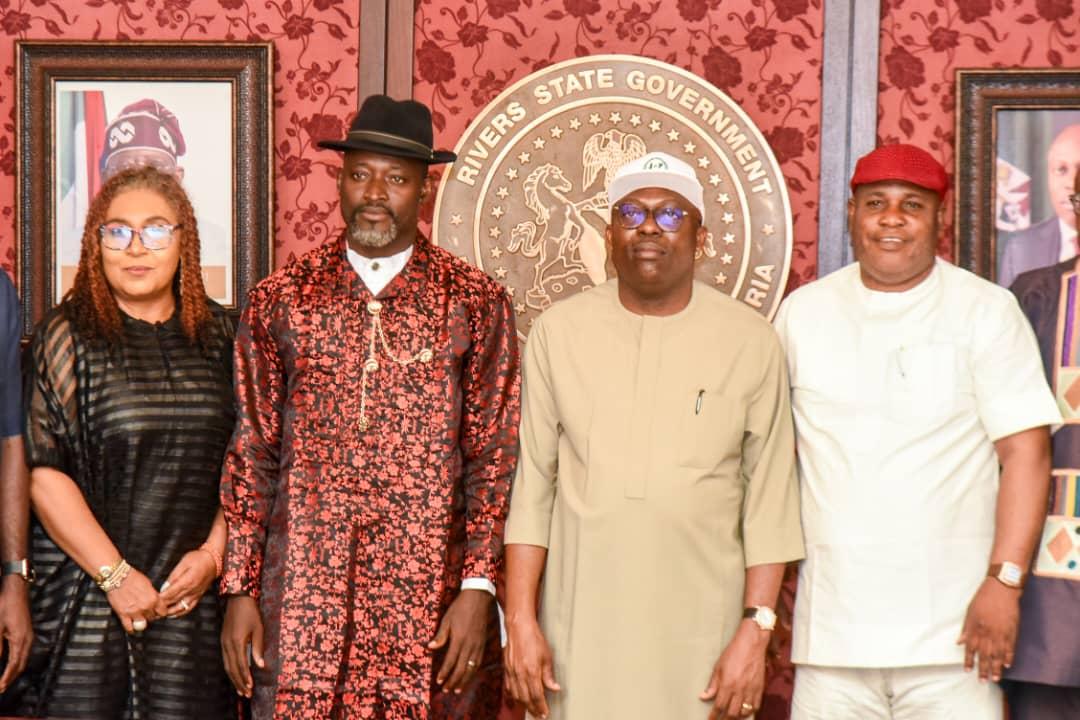
Rivers State Governor, Sir Siminalayi Fubara, has said that peace has prevailed because he draws strength from God to resist insults and tantrums thrown at him while frustrating attempts by some disgruntled persons who wanted to plunge the State into unending crisis.
The Governor also said that because he has anchored his Government on promoting peace, the enabling atmosphere has been provided for investments and sustainable development to flourish.
Governor Fubara made the assertion when he received a delegation of members of the Bishops and Gospel Ministers’ Association International Incorporated, Rivers State Chapter, at Government House in Port Harcourt, yesterday.
Represented by the Head of Rivers State Civil Service, Dr George Nwaeke, Governor Fubara said while most people took his meekness for weakness, his stance on peace has unarguably enhanced harmonious atmosphere of concord as residents sleep with their two eyes closed, and investors and shareholders are happy with the returns on investment.
He said, “Before, what they hear of Rivers State is that they are fighting, and some genuine investors will not come. Some people even ask you: How are you coping in Rivers State?
“But now”, he asserted: “The Governor has brought about a lot of changes in the State. One of the most important things is that he has changed the negative narrative. It is no longer Rivers of blood. It is now Rivers of peace.
“We are enjoying our lives here. Why? Because there is a change in the narrative. We have peace. The Governor is, as much as possible, absorbing any level of insult at him only for one purpose: that Rivers State may have peace; that we may grow; that this state will experience genuine development.”
Governor Fubara urged them, as members of the Christian family in the State, to continue to pray for the State and the Government so that the enemies of the State will be put to greater shame.
“This peace is what I want you to embrace. Go and continue to pray, because when the sower of the seed went and sowed, the enemy went in the night and sowed tares inside there. But the Governor is sowing peace.
“When I listened to the leader of the team, His Grace Eddy Ogbonda, he said you came all the way from Eleme Junction, and stopped at major junctions, and you uttered prayers for the peace of Rivers State.”
He also said: “I, hereby want to thank you for identifying with the Governor at a time like this. At a time when it looks as if someone wants the Governor’s peace posture misunderstood as weakness.
“When someone has the strength to fight back, but refuses to fight back. That is a bigger strength; that power of restrain does not just come, it can only come from God.
“You cannot give peace, if you do not have peace within you. The Governor is not interested in any form of trouble or violence. What he is interested in is known, and it is: let there be peace in Rivers State,” he said.
In his address, leader of the group, Archbishop Eddy Ogbonda, said they had observed a week-long intensive prayers that culminated into a peace rally, which brought them to Government House, and assured the Governor that God will continue to give him victory over his adversaries while preserving Rivers State.
“It is Rivers State Prophetic Prayer Convocation and Rally 2024 with the theme: ‘Peace be still’. Of a truth, everyone of us understands that we live in a time when we need peace much more than any other thing.
“Rivers State needs peace. Everyone as individuals need peace. The country needs peace, and the world at large needs peace. So, we are here to do a peace march. We pray that God will command His peace to reign in Rivers State,” he said.
Featured
Hoteliers, School Owners Charging In Dollars Risk Arrest -EFCC
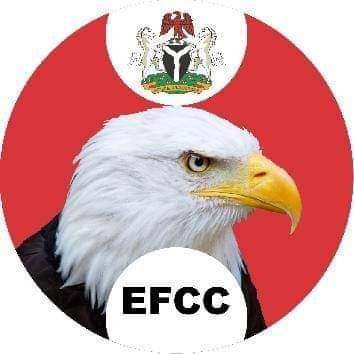
The Economic and Financial Crimes Commission (EFCC) has stated that hotels, schools, and other establishments that accept payments in dollars from their customers are at risk of facing arrest.
The Chairman of EFCC, Ola Olukoyede, said this in the agency’s publication called EFCC Alert on Monday, adding that action would be taken against individuals involved in the dollarisation of the economy.
According to him, the exception is if foreigners come in to transact business and the only means of transacting is their credit card and dollar but to charge local customers in dollars or other foreign currencies would no longer be allowed.
He said charging local activities and customers in dollars is against Nigeria’s constitution.
The EFCC chairman said, “Schools that charge Nigerians in dollar, supermarkets that trade in dollar, estate developers that sell their property in dollar, hotels that are invoicing in dollar, we are coming after you and we have made arrests in that area.
“Yes, if foreigners are coming in and the only means of transacting is their credit card, and dollar, why not? You will get that.
“But document it properly as against selling things within the system, local economy and you will be using dollar as the medium of exchange, it is illegal.
“Our law does not allow for that. And we have also affected some arrests.”
Featured
Eid-El-Fitr: Fubara Felicitates Muslims, Calls For Unity, Tolerance
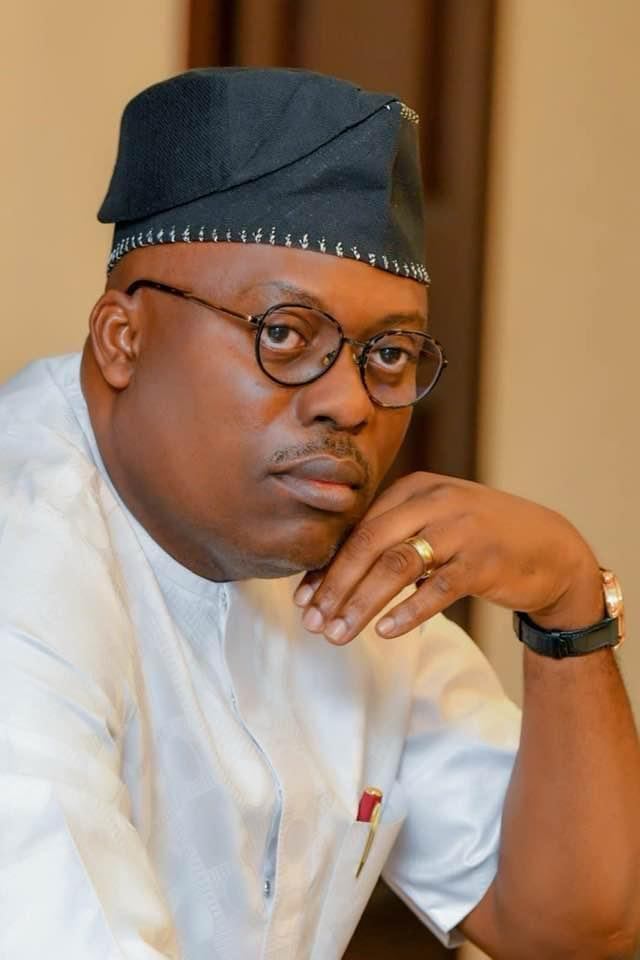
Rivers State Governor, Sir Siminalayi Fubara, has enjoined Muslim faithful to remain steadfast to the lessons learnt during the holy month of Ramadan.
Governor Fubara stated this in his message of felicitations to Muslims as they celebrate the 2024 Eid-el-Fitr Sallah, which marks the end of the one-month Ramadan fasting.
The Governor emphasised the importance for Muslims to also uphold the tenets of Islam by exhibiting the fear of God and showing piety in their daily work.
Governor Fubara said, “We must all continue in the good attributes imbibed during the holy month of Ramadan as directed by God through His Prophet, so as to ensure peace, unity and harmony in the society for a better future.”
While praying that the essence of the festival offers them happiness, peace and prosperity in all aspects of life, Governor Fubara said he recognises and appreciates the critical role that the Muslim community continues to play in the development of Rivers State, and indeed, Nigeria at large.
Governor Fubara charged them to remain unwavering and steadfast in their commitment and positive contributions to advance the development of the State and the country.
“I enjoin you all in the State to remain calm, be patient and continue to do what is right,” the Governor added.
He wished the Muslim faithful in the State and across the country a happy Eid-el-Fitr celebration.
-
Sports3 days ago
NLO: Khana FC Coach Blames Players For Missing Chances
-

 Maritime3 days ago
Maritime3 days agoLilypond Customs Exports $236m Worth Items In Q1
-

 News3 days ago
News3 days agoCameroon Restates Commitment To Partner Nigeria On Forestry, Wildlife Conservation
-

 Politics3 days ago
Politics3 days agoLG Chairman-Elect Blames Insecurity On Parental Failure
-

 Rivers3 days ago
Rivers3 days agoRIMA Set To Disburse Loan To Over 500 Small Businesses In Rivers
-
Sports3 days ago
Expert Wants Parents To Enroll Children In Vector Programme
-

 Maritime3 days ago
Maritime3 days agoFG Launches National Single Window Steering Committee
-

 News3 days ago
News3 days agoAgain, NCDMB Emerges Best Performing Agency


